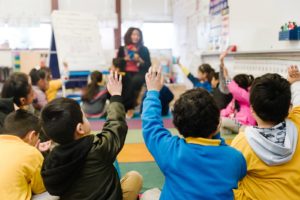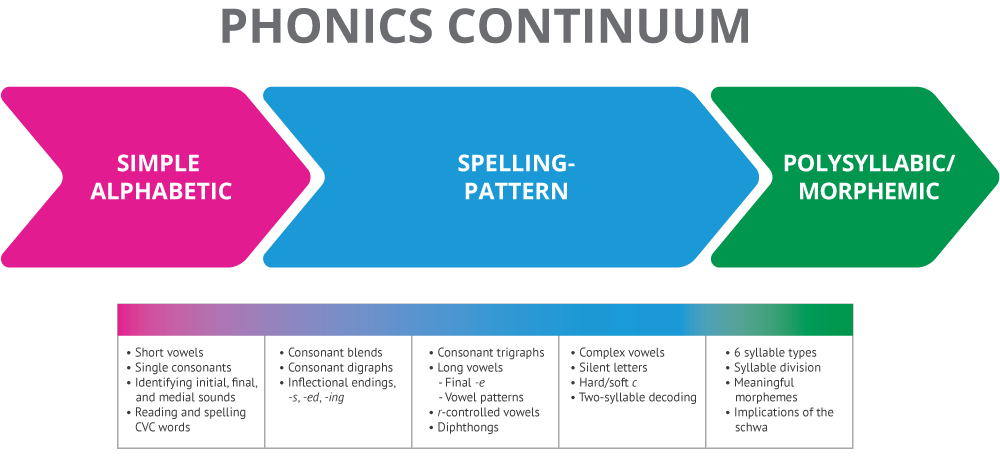 As educators, we can all reflect on what we might have done differently over the past 18 months. While these reflections have value, the most urgent questions are forward-looking. Now is the time to ask ourselves: when accelerating learning, what matters most?
As educators, we can all reflect on what we might have done differently over the past 18 months. While these reflections have value, the most urgent questions are forward-looking. Now is the time to ask ourselves: when accelerating learning, what matters most?
With an array of student needs to consider, we must be strategic and intentional in our priorities. Therefore, when the goal is accelerating learning, two strands are the most impactful: community building and foundational skills instruction.
Why Community Building and Foundational Skills Are So Important
An extensive body of research demonstrates that building a safe, caring learning community and cultivating students’ sense of belonging are essential to academic success (Durlak et al, 2011). In the current environment, this work is more important than ever, since many students have experienced stress or trauma in the form of hunger, neglect, abuse, fear of COVID, as well as family illness or death. In addition, whether our students spent the majority of the 2020–21 year in a school building or at home, social distancing protocols have limited the ways in which children have been able to connect.
Alongside community building, foundational skills instruction is a second, equally important strand for the acceleration of learning. As literacy educators we know that proficiency in foundational skills is the prerequisite that allows all the other facets of literacy to develop. The science of reading is clear: students must be proficient in phonological awareness, decoding, encoding, and fluency in order to engage in deep literacy experiences.
While building community and cultivating mastery of foundational skills are very different, both strands are necessary if we hope to accelerate learning and attain academic success for our students.
Ensuring a Safe and Supportive Learning Environment
When students see themselves as active, valued members of a classroom community, they are more likely to engage fully in learning and take the academic risks necessary to grow.
In the wake of COVID, building a safe, supportive learning community is more important than ever. A strong community also helps teachers support students in the wake of the trauma that many have experienced.
Addressing these needs early, directly, and often is essential to accelerating the community building necessary for students to feel calm and connected. Ensuring that students experience a relationship-centered environment with specific time for creating community and trust is integral to “building back better” (Darling-Hammond, 2021). Teachers need concrete tools and resources to help students reconnect and to establish a safe, supportive learning context in which they can continue to develop.
Direct Teaching of Social Skills
One strategy for ensuring a safe and supportive environment, both virtually and in-person, is the direct teaching of social skills. All students need support to be flexible and resilient when they encounter challenges, and all students arrive at school with skills they have learned to help them survive. The social skills that students need to thrive in school, however, are sometimes different from the skills they need to cope outside of school.
As students return from these uncertain times, they may be feeling more anxious, scared, or confused. In order to successfully focus on learning content, such as reading or writing, students must have the opportunity to learn and practice social skills and social-emotional competencies such as self-awareness, self-management, social awareness, relationship skills, and responsible decision-making.
Class Meetings
Another strategy for accelerating community building is the use of Class Meetings. Class Meetings consist of teacher-led conversations around a particular topic. Specific ground rules govern the discussion. (For example, one person talks at a time, the students listen to one another, and they allow differences of opinion.) The teacher’s role in these meetings is to create an environment in which students’ experiences, opinions, and concerns are taken seriously. The students’ role is to participate as valued and influential contributors to the classroom community.
Class Meeting topics that could be particularly relevant to this year are Keeping Each Other Safe, Developing Empathy, and Returning from Remote Learning. Ensuring that teachers have time to understand their students’ social-emotional needs is of paramount importance for the school year. Our complimentary Reconnecting and Rebuilding Toolkit contains Class Meetings and resources to support educators with this vital work.
Acceleration Requires an Asset-based Framework
Before we delve into the strand of foundational skills instruction, it’s vital that we acknowledge a larger and critically important truth: acceleration of learning requires that we engage with students using an asset-based framework. We must resist a deficit mindset and push back against simplistic narratives of “learning loss.”
Yes, instruction may have been fragmented during the pandemic, but students continued to learn (Hammond, 2021). We must recognize and honor students’ home-based and community-based learning experiences and then build our instructional plans on the strong foundations of these gains.
Accelerating and Teaching Foundational Skills to Mastery
Begin with Assessment
The first step in acceleration is initial assessment. Beginning with assessment ensures that we don’t spend precious time repeating content that students already know. Nor do we assume that we need to “cover” what they “missed.” When a quality assessment is used early on, we can move efficiently to the next step in student learning.
When preparing to teach foundational skills, it’s essential that this initial assessment precisely identifies where each student falls along the phonics continuum. As students progress in the instruction from simple alphabetic skills to more sophisticated spelling-pattern and polysyllabic/morphemic skills, accelerated learning requires that we start by knowing exactly where in the continuum each student is.

A Systematic Approach To Instruction
As we consider the phonics continuum, we must utilize a systematic approach to foundational skills instruction if we wish to truly accelerate learning. Here are three important factors when planning an accelerated approach to this instruction:
Scope and Sequence
A clear scope and sequence supports instructional decision-making regarding exactly where instruction should begin. It also provides an understanding of where the benchmark is for a particular grade level. Following a clear scope and sequence also guarantees that valuable instructional time is not wasted on skills and concepts that are not relevant.
Explicit Lesson Structure
An explicit lesson structure is defined as one in which instruction is clear and deliberate, using specific routines in which the teacher models and the student practices in every lesson. An explicit lesson structure—one that allows the student to truly focus on the skill being learned rather than deciphering varying instructional language—is supportive of accelerative learning, as well.
When students know what to expect and how content will be taught and practiced, they are better able to devote their cognitive energy to the learning itself.
Mastery-Based Assessment
Even with a clear scope and sequence and explicit lesson structure, we must ensure that students are making the expected progress. In the absence of intentional progress monitoring, students may begin to fall further and further behind. Mastery assessments at distinct intervals allow educators to make adjustments to the pacing of instruction and to ensure that students are acquiring the necessary skills.
Meeting Our Students Where They Are
The specific needs of our students are foremost in our minds as we embark on the 2021–22 school year. As educators, it is our obligation to meet all students where they are—socially, emotionally, and academically. We must use an asset-based framework, honor and engage with students’ growth and learning experiences from the past year, and guide them as they continue to learn.
Students need safe, supportive, and relationship-centered classroom communities in order to engage fully and take the risks necessary for academic growth to occur. They will also need systematic, high-quality foundational skills instruction so that they are able to access and engage with increasingly complex texts and tasks. By intentionally focusing on the twin strands of community building and foundational skills, we can accelerate learning and ensure that all of our students thrive.
